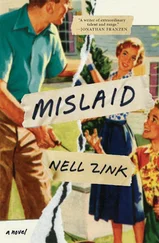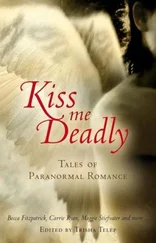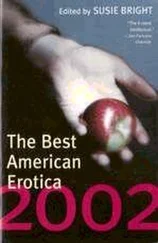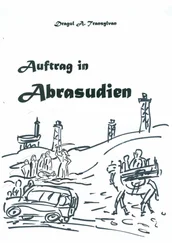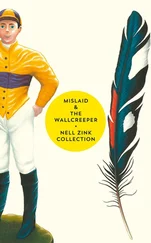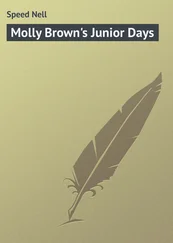Annoyed by the challenge to his preconceptions, the customer service frat boy flipped it to hear the B side. Massive riffage blasted from the store’s speakers while the same voice cried out, “American woman!” The vocals were lower in the mix than on “Hold the Key” and conveyed a note of pain definitely lacking in the original. It sounded as if the American woman really had the singer cornered this time. It was less a succession of throwaway insults than a cry for help. The bass recalled live Yes or King Crimson, with the kind of distortion that peels paint off distant walls.
“I’m in love,” the stock girl said. “Do you think that was his baby?”
“It definitely wasn’t his single,” the frat boy replied. “That guy was a retard. That’s who the breeders are. Not smart people. That’s why we’re devolving.”
DANIEL BOUGHT FACTSHEET FIVE , THE FANZINE THAT CATALOGED FANZINES, AND PAGED through it, noting down the names and addresses of likely sounding targets. First he sent promo singles to riot grrrly magazines such as Bust and Chickfactor. (Post-punk women had exchanged duct tape on their nipples for heels and cocktail dresses without compromising their ironic focus on objectification by the male gaze and the appropriation of epithets intended to belittle and demean them.) Likewise he mailed promos to painfully masculine publications such as Thicker and the Probe . He tried for attention from mass-market monthlies with nationwide distribution ( Spin, Alternative Press) and tabloid weeklies ( Village Voice, City Paper), which got five singles each, instead of one, on account of their big staffs.
He truly didn’t expect any competent reviewers to approve the single by this means, but it was all he had. Music being a matter of taste, and the urge to help a struggling artist rare, he counted on wasting hundreds of dollars in postage alone in return, if he got lucky, for three or four inattentive reviews.
After about two months, he had his first responses: amiable paragraphs in modest publications—five-by-eight xeroxed, stapled, folded fanzines with circulations in the hundreds—all of which said that the single was “gorgeous.” That was the adjective du jour. In the age of grunge, anything that didn’t sound like a riding lawnmower was gorgeous. Several of the reviews arrived with demo cassettes from the reviewers’ bands. The one he liked best sounded like lawnmowers ridden by nymphets playing banjos, but he didn’t have the money to put out another single. Every time a review arrived, he cut it out with scissors and pasted it to the letter-sized sheet of paper he called the “press kit.”
JOE LACKED THE ROCK STAR’S STANDARD NEUROSES. HE FELT NO BASELESS CONVICTION that he was a genius. He had never needed illusions to feel good about himself, and his illusions had never been exposed. Unencumbered by the guilty suspicion that he was secretly a no-talent impostor, he had zero inhibitions about telling the world. Soon hundreds of people with no interest in music and less inclination to buy seven-inch singles were quite pointlessly aware that he had one out. The mail carriers knew it, as did the transvestite from Essex Street with the Yorkies, the girl who made the egg creams on First Avenue, the schizophrenic who sat on the discarded end table next to the BMT entrance on Houston, et cetera.
He liked magazines and he liked helping Daniel, so whenever he came near it, he stopped into See Hear, a large alternative newsstand in the East Village that specialized in music fanzines. He leafed through every magazine—dozens of new issues each week—checking each one under H and J to make sure they didn’t miss a review of his work. So it was he who found the notice in Forced Exposure .
Joe Harris. “Hold the Key” b/w “American Woman” 7"(Lion’s Den). Ruins meets Badfinger in a jar of Gerber’s. Mark my words: You don’t need to hear this, and whoever mic’d the drums on it should die facedown in a pile of dog shit with an AIDS-infected needle up his ass.
It was the first time he had seen a review before Daniel did. He wasn’t sure what to think. It was troubling enough that he didn’t even point to it and say, “Look! Forced Exposure reviewed my record!” to the cashier when he paid for it. He paid and left, walking with studied briskness toward Chrystie Street, repeating key phrases such as “facedown in a pile of dog shit” to himself with his first-ever inklings of self-doubt.
Daniel didn’t mind being awakened from a Saturday afternoon nap (Pam was out clothes shopping) to read it. A review in Forced Exposure was exciting to him.
“Admittedly hard to parse,” he said, “but definitely positive. Ruins is good.” Ruins was a Japanese improvising bass and percussion duo widely regarded in avant-garde circles as ultimate rock gods. “Badfinger means British invasion without the invasion. They’re saying it’s not bluesy.”
“And Gerber’s?” Joe protested. “That’s baby food!”
“They’re saying you can’t play guitar.”
“But I don’t play guitar, or drums either!”
“They’re making a funny about the drums.” Daniel turned to the front of the magazine and glanced through the features. “Oh, look. Here’s a sex scene between you and Thurston Moore.”
“A what?”
Daniel was too busy laughing to answer right away. “It’s a fake Sonic Youth tour diary. He loses his virginity to you in the ladies’ room at Wetlands. Definitely do not read this. They’re not trying to pluck you from obscurity, like they do with crappy Swedish speed metal. It’s like they think you’re already famous.”
Joe perused the tour diary entry. “‘The probing, darting fist of it-boy Joe Harris,’” he read aloud. “I’m the ‘it-boy’!”
“You’re the it-boy,” Daniel said. “High five.”
He clipped the one-paragraph review and added it to the press kit, unobtrusively, at the bottom, with his official media relations glue stick.
Daniel had assumed that Joe’s first gigs would be open-mic nights at anti-folk clubs on Ludlow, squaring off against stoned women in fringed vests. But given the excellent publicity, he felt emboldened to try booking him into a rock club. It could happen. Most new artists had cassette demos and no press. Joe had a seven-inch forty-five and something approaching sanctification from Forced Exposure .
The first step was audition night at CBGB, as much as Pam dreaded the idea of ever seeing the place again. Her first reaction was an uncharacteristically whiny “Do I have to go?” She offered to stay home with Flora. When Daniel said he would buy her sunglasses and a floppy hat, she realized that she was being needlessly vain. No one would connect a backbencher holding a baby in Joe’s entourage with the pitiful diva of the Diaphragms.
Since CBGB bought a weekly ad in the Village Voice to list the auditioning bands, Joe’s name appeared in the paper. Dozens of people in New York City were regular readers of both the Voice and Forced Exposure .
“Dozens” doesn’t sound like a lot, but the farther you got from New York, the more attention was paid to media, which, after all, serve to “mediate” between the individual and lived experience. Indie rock fans who couldn’t afford basic cable were more likely to have heard of Slint than Nirvana.
As a result, the show wasn’t entirely empty. The girl who had made off with Joe’s singles from Tower Records—ensuring that Tower would never become his distributor—was there, accompanied by the friend on whom she’d pressed her spare single. They wore vintage flower-print housecoats over turtlenecks and thick wool tights and were drinking beer. When Joe took the stage, they yelled, “Hold the key! Hold the key!” Flora lay in Pam’s arms, earplugs deep in her ears, swaying with the beat. Joe played through two amps—his own new bass rig and Pam’s Marshall—with a Whirlwind splitter to divide the signal. The effects loop on the bass amp ran through her MXR distortion. The guitar amp, with the reverb turned way up and the treble way down, was fed through her Foxx fuzz-wah. Joe’s voice and the grinding of his valiant Hartke cabinet’s indestructible aluminum speaker cones cut through the haze of feedback echoing from the tortured Marshall, and he sang all his finest nonsense as though his soul were on fire. Instead of “American Woman,” he closed with “Roll with the Changes” by REO Speedwagon.
Читать дальше


